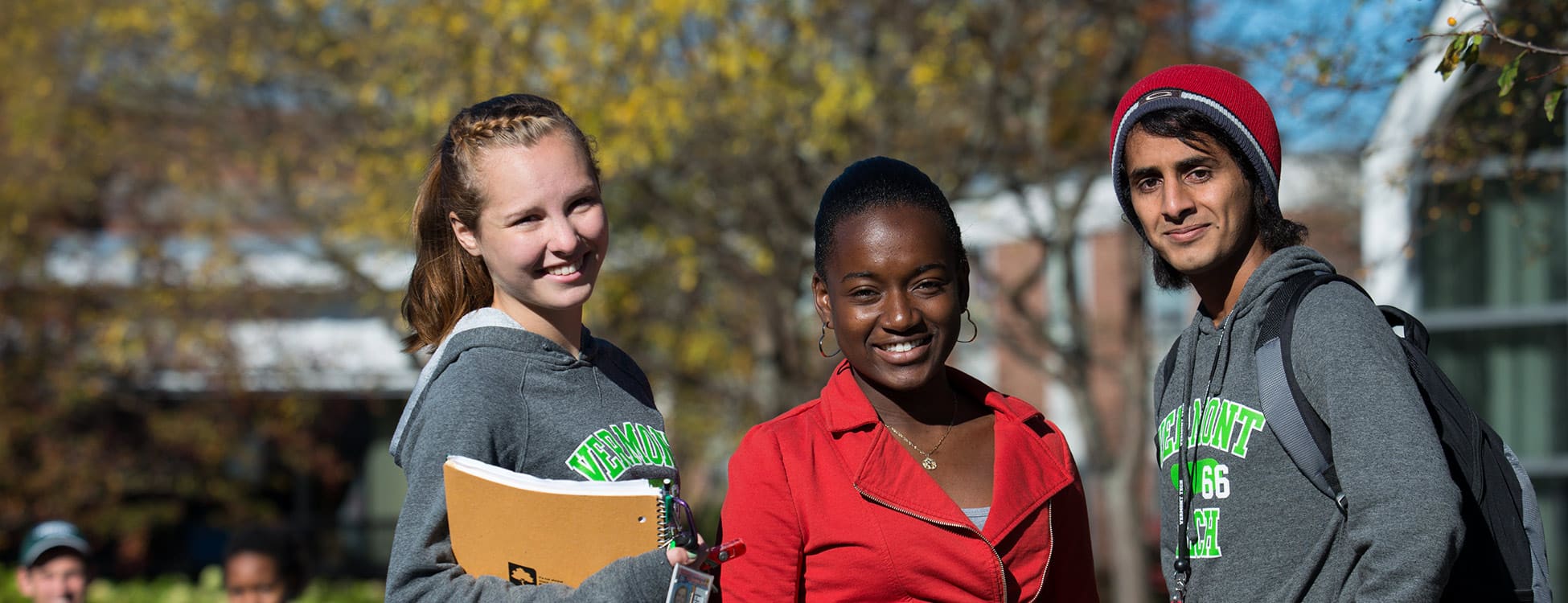
Vermont Tech is committed to the intellectual and personal development of every student. Our educational programs foster the development of the whole person. This philosophy also aligns with Vermont Tech’s Definition of an Educated Person:
Vermont Tech faculty, staff, and students believe that an educated person is one who assumes responsibility for their own learning, for career preparation, and for citizenship. We believe that an educated person consistently strives to reach their full potential, can think critically, is globally aware, is civically engaged, is curious, and is an effective communicator.
We seek to foster an appreciation in each student for the major domains of human achievement; to provide a common educational experience; to refine ethical reasoning, critical thinking, writing, information literacy, communication, and quantitative and qualitative reasoning skills; to nurture civic, cultural, and global awareness and responsibility; to celebrate diversity and common values; to foster lifelong learning; and to produce a well-rounded graduate.
A baccalaureate graduate from Vermont Tech will be able to:
- Effectively speak, write, and communicate with a team
- Exhibit effective scientific and quantitative reasoning and problem-solving skills appropriate to their program field
- Prove effective qualitative and algorithmic reasoning skills
- Demonstrate an informed personal, civic, and social awareness
- Exhibit an informed aesthetic and cultural awareness
- Establish effective and ethical decision making skills
- Find and critically consider information from a wide range of sources
- Demonstrate essential skills and duties expected of professionals in their program field
- Continuously acquire new concepts, skills, and technologies in their program field
The college doesn’t guarantee that general education or elective courses are available and reserves the right to withdraw or restrict enrollment if a class is over-enrolled, under-enrolled, or the availability of faculty or other resources are limited. The student must still complete each requirement prior to receiving a degree. Some courses offered by major departments may fulfill elective requirements only for students who aren’t majoring in that department and only if the courses are approved for elective credit.
Course requirements may be fulfilled by simultaneous enrollment at other VSCS schools under the VSCS Consortium Agreement. Students can’t use one course to meet more than one requirement within their program except to meet a graduation standard or dual major/degree requirement.
The student works with their advisor to develop a plan to meet the general education elective requirements without requiring additional class loads or terms.
Associate Degree Requirements
Depending on specific program requirements, each associate degree student must complete the following general education requirements to meet the 20-credit minimum:
- 1 credit of Digital & Computer Literacy
- 3 credits of Fine Arts & Aesthetics/Humanistic Perspectives
- 3 credits of Written Expression (composition, writing, and research)
- 3 credits of technical communication
- 3 credits of Mathematics
- 3 credits of Social Sciences
- 4 credits of Natural Science
Bachelor’s Degree Requirements
Depending on specific program requirements, each bachelor’s degree student must complete the following general education requirements plus any other general education courses required to meet the 40-credit minimum:
- 3 credits of Written Expression (composition, writing, and research)
- 3 credits of technical communication
- 3 credits of Digital & Computer Literacy
- 3 credits of Fine Arts & Aesthetics
- 3 credits of Humanistic Perspectives
- 3 credits of Social Sciences
- 3 credits of either Fine Arts & Aesthetics, Humanistic Perspectives, or Social Sciences (3 credits minimum at the 3000 level)
- 6 credits of Mathematics
- 7 credits of Natural Science
- 6 credits of other general education courses
Fine Arts & Aesthetics, Humanistic Perspectives, and Social Sciences Elective Requirements (AH/SS)
Each student is exposed to methods of inquiry and major concepts in Fine Arts & Aesthetics, Humanistic Perspectives, and Social Sciences. Courses at the lower level are offered as survey and special topics courses to expose students to a broad array of concepts and enhance reading, writing, and communication skills. Courses at the upper level require a higher level of learning and understanding. SS electives include survey courses from ECO, GEO, HIS, PSY, and SSC. For current offerings, see the academic scheduling page.
English Requirements
Each student completes ENG 1061 or its equivalent or a sequence of courses that emphasizes reading and writing and requires the successful completion of a research paper. Degree students may satisfy the requirements by completing one of the following as determined by placement: ENG 1042 and 1060; ENG 1060; or ENG 1061.
Each student also completes ENG 2080 which emphasizes the principles and forms of communication in the workplace, including a technical report, and they complete coursework that emphasizes effective speaking, organization, and presentation skills.
Information Technology Requirements
Each student uses computer information technology, including internet orientation, research, email, word processing, and software applications applicable to their field of study.
Mathematics Requirements
Each student completes the mathematical or empirical techniques for problem-solving in logic and critical thinking appropriate for their program of study. In addition to the regular mathematics offerings, there are other courses under separate subject listings that satisfy the logic and critical thinking component of this requirement.
Natural Science Requirements
Each student explores the natural sciences, including a lab experience. The course of study is determined by the major and can be filled by coursework available as electives. These science courses include BIO, CHE, and PHY, as well as appropriate coursework under other prefixes.